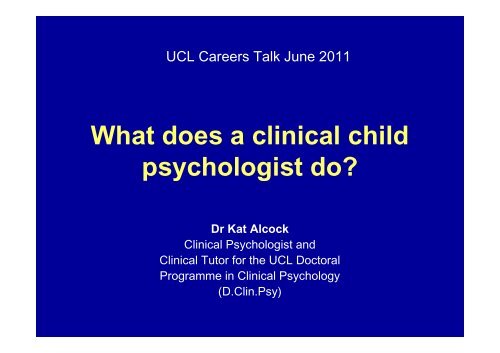Kat Alcock 11.pdf - Online.psychol.ucl.ac.uk
Kat Alcock 11.pdf - Online.psychol.ucl.ac.uk
Kat Alcock 11.pdf - Online.psychol.ucl.ac.uk
- No tags were found...
Create successful ePaper yourself
Turn your PDF publications into a flip-book with our unique Google optimized e-Paper software.
UCL Careers Talk June 2011What does a clinical child<strong>psychol</strong>ogist do?Dr <strong>Kat</strong> <strong>Alcock</strong>Clinical Psychologist andClinical Tutor for the UCL DoctoralProgramme in Clinical Psychology(D.Clin.Psy)
What is clinical <strong>psychol</strong>ogy?The application of a number of different <strong>psychol</strong>ogicaltheories and models to:• reduce distress• promote <strong>psychol</strong>ogical well-being and• promote optimal functioningwith a wide variety of clients in a diverse range of settings.
What doclinical <strong>psychol</strong>ogists do?Multiple Roles:• Utilise a variety of evidence-based therapies (e.g., CBT,systemic psychotherapy, psychodynamic psychotherapy)for issues affecting mental health. Process of therapy:Assessment, formulation, intervention.• Multi-agency working• Service design, delivery & evaluation• Consultation to other professionals/organisations• Te<strong>ac</strong>hing• Supervising• Policy consultation• Research• Input into training in a wider sense - Clinical tutor role
What about clinical child<strong>psychol</strong>ogists?
How might a child clinical<strong>psychol</strong>ogist’s job look?• Client sessions (outpatient clinic, hospital ward, homevisits, GP surgery, children’s centre, community setting,nursery/school observations, psychometric testing)• Types of issues: massive range – imp<strong>ac</strong>t of diagnosessuch as ADH or AD/HD, sleeping, feeding, behaviourmanagement to coping with bereavement, divorce,illness, low mood, fears and worries, bullying, identityetc.• Working individually with child, through parents, wholefamily, groups (e.g., parenting classes), systems such asschools.• Note keeping, report writing etc
How might the job look contd.• Lots of communication with/consultation to otherprofessionals (medical colleagues, GPs, te<strong>ac</strong>hers,educational <strong>psychol</strong>ogists, social workers, voluntarysector agencies…).• Te<strong>ac</strong>hing sessions for other professionals (e.g.,emotional and behavioural development, depression inthe post-natal period with health visitors)• Presentations• Supervising trainee clinical <strong>psychol</strong>ogists• Meetings – discuss referrals, business relating toservice, service development etc.• Clinical audit/evaluation – e.g., how effectively are wemanaging clients’ presenting concerns?
How do I become a ClinicalPsychologist?• Academic requirements: GBR, Upper 2:1• NHS-Funded 3yr training – you get paid to train!• Work experience: assistant <strong>psychol</strong>ogist, nursingassistant, therapeutic worker
Tips• Cont<strong>ac</strong>t departments with CV and covering letter• Paid and voluntary experience is <strong>ac</strong>ceptable• Find a way to get some time with a Clinical Psychologist• NHS Jobs website• BME opportunities – Widening Access day and BMEmentoring programme
Why do I love my job?• I have a low boredom threshold.E<strong>ac</strong>h day is different – I enjoy the variety, learning andbeing stretched on a daily basis.• It feels like a privilege to be invited into someone’sfamily, for them to share their concerns with me, and tobe able to help make small changes that can make a bigdifference (developmental trajectory - lifespanperspective).• Working with children and young people is fun and ahighly creative process – use of toys, puppets, drawings,books, film etc.





